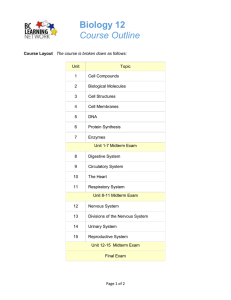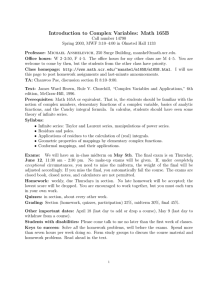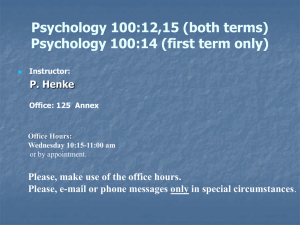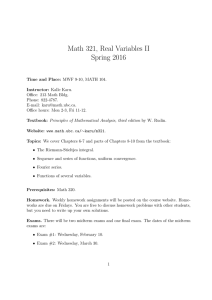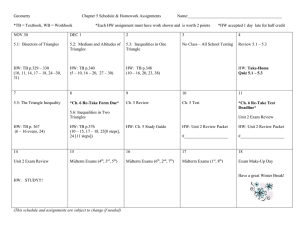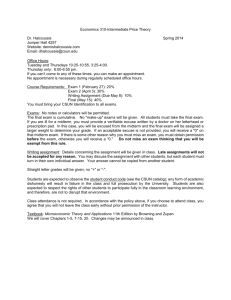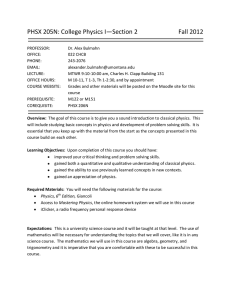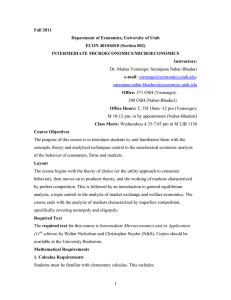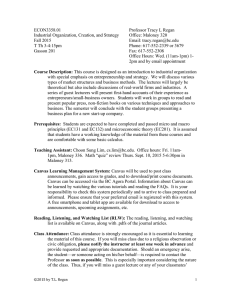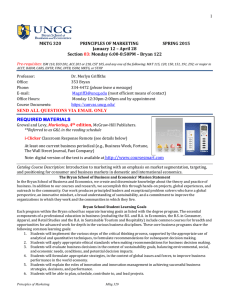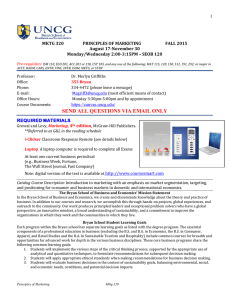Boston College Department of Economics Econ 2201.06 – Microeconomic Theory
advertisement
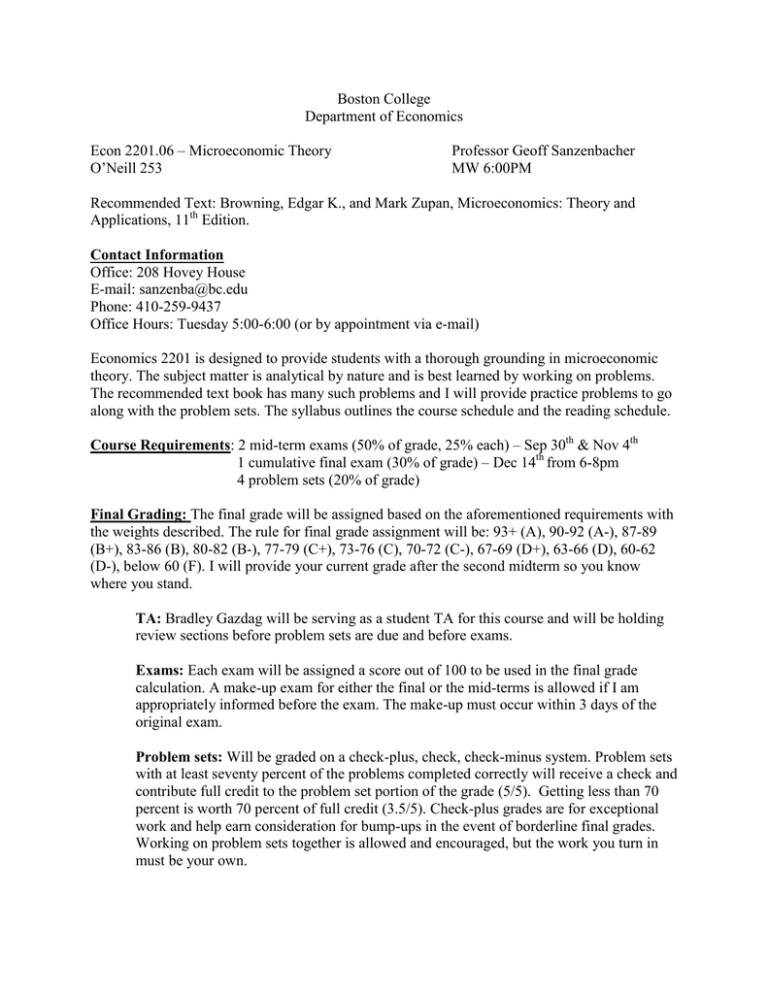
Boston College Department of Economics Econ 2201.06 – Microeconomic Theory O’Neill 253 Professor Geoff Sanzenbacher MW 6:00PM Recommended Text: Browning, Edgar K., and Mark Zupan, Microeconomics: Theory and Applications, 11th Edition. Contact Information Office: 208 Hovey House E-mail: sanzenba@bc.edu Phone: 410-259-9437 Office Hours: Tuesday 5:00-6:00 (or by appointment via e-mail) Economics 2201 is designed to provide students with a thorough grounding in microeconomic theory. The subject matter is analytical by nature and is best learned by working on problems. The recommended text book has many such problems and I will provide practice problems to go along with the problem sets. The syllabus outlines the course schedule and the reading schedule. Course Requirements: 2 mid-term exams (50% of grade, 25% each) – Sep 30th & Nov 4th 1 cumulative final exam (30% of grade) – Dec 14th from 6-8pm 4 problem sets (20% of grade) Final Grading: The final grade will be assigned based on the aforementioned requirements with the weights described. The rule for final grade assignment will be: 93+ (A), 90-92 (A-), 87-89 (B+), 83-86 (B), 80-82 (B-), 77-79 (C+), 73-76 (C), 70-72 (C-), 67-69 (D+), 63-66 (D), 60-62 (D-), below 60 (F). I will provide your current grade after the second midterm so you know where you stand. TA: Bradley Gazdag will be serving as a student TA for this course and will be holding review sections before problem sets are due and before exams. Exams: Each exam will be assigned a score out of 100 to be used in the final grade calculation. A make-up exam for either the final or the mid-terms is allowed if I am appropriately informed before the exam. The make-up must occur within 3 days of the original exam. Problem sets: Will be graded on a check-plus, check, check-minus system. Problem sets with at least seventy percent of the problems completed correctly will receive a check and contribute full credit to the problem set portion of the grade (5/5). Getting less than 70 percent is worth 70 percent of full credit (3.5/5). Check-plus grades are for exceptional work and help earn consideration for bump-ups in the event of borderline final grades. Working on problem sets together is allowed and encouraged, but the work you turn in must be your own. IClicker Question Extra Credit: Attendance isn’t mandatory, but questions will be asked during class using the Iclicker system. The class will then be given a chance to discuss the question and then be re-polled. If over 60 percent of the class get the answer right ¼ of a point will be given as extra credit on the final. Course Organization and Expectations Lectures: There are two lectures per week most weeks, save for holidays (See schedule below). While there is no attendance grade for the course, attendance is required to do well on exams. Complete lecture notes will be provided via e-mail for only two missed classes. I will post lecture outlines via Canvas. Readings: The text reading for each lecture is provided in the schedule below. When the date for the reading changes, I will inform you accordingly. The text is a very useful tool that should be used frequently – although it is not required it is strongly recommended. Doing practice problems from the text (even if they are not assigned as a problem set) is always a good idea). Integrity: While working together on problem sets is encouraged, working together on exams is (obviously) forbidden. Please familiarize yourself with the “Academic Integrity” section of the Boston College Catalog, which is also available online. Canvas: I will be using Canvas to provide you with a variety of information, including handouts I will create, the problem sets, the problem set solutions, and lecture outlines. In conclusion, let me say welcome to the course! Economics is an exciting subject area that will help you better understand the world you live in. Please keep up with current events and feel free to ask me about them in class. It is very likely you will find the material difficult. Let me assure you this is normal and encourage you to visit my office or e-mail me with any questions you might have. Good luck! Here is a brief outline of the course and reading assignments. Date Reading A Model of Consumer Behavior August 31 – Introduction – The market economy Chapter 1 September 2 – Utility and Preferences Chapter 3.1 September 7 – Labor Day - No class September 9 – Budget constraints Consumer optimization Chapter 3.3 Using the Model to Analyze Changes in Prices September 14 – Changing prices and income Chapter 3.4 September 16 – Comparative statics Elasticity Chapter 4.1, 4.6 September 21 – Income and substitution effects Chapter 4.2 – 4.4 September 23 – Analysis of consumer welfare Obamacare and Consumer Behavior Chapter 4.5 Chapter 5.2 September 28 – No Class – Study Time (Review Session Tuesday Night) September 30 – Midterm 1 -- Consumer Behavior in Other Settings October 5 – Borrowing and saving Chapter 5.5 October 7 – Expected utility and insurance Chapter 5.6 October 12 – Columbus Day – No class October 14 – Model of labor supply Applications of labor supply model Chapter 17.1-17.3 Theory of the Firm in Competitive Markets October 19 – Theory of the firm Profit maximization Chapter 7.1 – 7.2 October 21 – The production function Chapter 7.3-7.6 October 26 – Costs in the short run Costs in the long run Chapter 8 October 28 – Profit maximization and the price taking firm Chapter 9 November 2 – Finishing up profit maximization Review for Midterm 2 Chapters 5 – 9, Chapter 17 November 4 – Midterm 2 -- November 9 – Brush up on profit maximization Equilibrium in competitive markets Chapter 9 November 11 – Applications of competitive market theory Analysis of Taxation Chapter 10.1-10.3 When Competition Breaks Down November 16 – Monopoly theory Chapter 11.1 – 11.2 November 18 – Applications of Monopoly theory Chapter 11.3-11.6, 15.3 November 23 – Monopolistic competition Oligopoly and strategic behavior Chapter 13.1-13.2 November 25 – Thanksgiving – No class Strategic Behavior November 30 - Finish Oligopoly 13.1-13.2, 13.4 December 2 – Introduction to game theory 14.1-14.2 December 7 – Game theory 14.2-14.3 December 9 – Finish game theory Review for final 14.3 Please Note: This schedule is an outline for the course and is subject to change as I feel necessary or because of inclement weather. Any changes will be noted by me during class.
